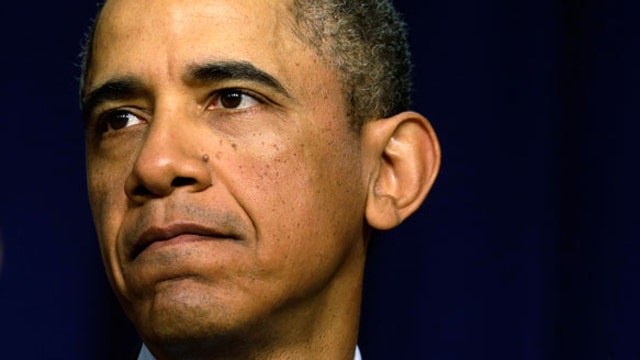Pro-Obama group picks up president's sequester scare tactics
Reaction from Washington Times columnist Charlie Hurt
President Obama met Wednesday with House Republicans in an apparent bid to find consensus on fiscal policy, even as he seemed to antagonize the other side by claiming there's no "immediate crisis in terms of debt."
His statement would be sharply at odds with a core Republican principle that the debt must be addressed soon -- and which underpinned the cost-cutting GOP budget released Tuesday. The president also acknowledged, in an interview aired earlier in the day, that differences with the GOP might be "too wide" to bridge.
Still, the president made the rare visit with House Republicans on Capitol Hill as part of what some are calling his charm offensive. The president is making a renewed effort to meet with Republican leaders and rank-and-file lawmakers amid overlapping budget battles and a series of deadlines on the horizon.
The president is trying to find common ground with Congress in order to halt the sequester spending cuts, which have already taken effect -- as well as pass a stopgap budget bill in order to avert an end-of-the-month government shutdown, pass a bona fide budget for next year and once again raise the debt ceiling.
A source in the room during the meeting with Republicans told Fox News that Obama told them he's looking for bipartisanship on a range of issues, including fiscal matters, immigration, gun regulation and foreign policy.
One skeptical source told Fox News, "we shall see." Rep. Paul Ryan, R-Wis., though, later emerged saying the president "did himself some good."
Obama went into the meeting with his aides and allies ripping House Republicans for their newly introduced budget, which aims to balance the country's finances in 10 years. In an interview with ABC News, the president declared that there is no "immediate" debt crisis and that "for the next 10 years, it's going to be in a sustainable place."
That message is likely to rile Republicans, who cite widespread economic warnings in saying the debt -- which is nearing $17 trillion -- must be addressed.
"We are addressing the most predictable debt crisis in this country's history," Ryan, chairman of the House Budget Committee, said Tuesday while introducing his budget plan, which was approved by the House panel by a 22-17 party-line vote.
White House Press Secretary Jay Carney said Wednesday that "everybody" recognizes there is a "long-term debt challenge."
And he said the president "believes that bipartisan cooperation is possible."
Senate Democrats were unveiling their budget proposal Wednesday afternoon, in response to the House Republican plan introduced Tuesday.
The plan calls for $975 billion in new tax revenue through closing loopholes and ending deductions and credits benefiting corporations and the country’s highest wage earners.
It also calls for $100 billion in new stimulus spending while cutting $1.85 trillion from the deficit over 10 years. The rest of the savings would come through spending cuts.
Senate Budget Committee members will begin voting and submitting amendments Thursday, with a full Senate vote expected by next week.
The Republican plan touts longstanding party proposals to cut funding for domestic programs, repeal Obama's health care reform law and overhaul the Medicare health care program for the elderly. It would balance the federal budget in 10 years with steep spending cuts alone -- a nonstarter with Democrats.
"Ultimately, it may be that the differences are just too wide," Obama said in the interview broadcast Wednesday.
If Republicans insist that their only solution is to avoid tax hikes and "gut" entitlement programs, "then we're probably not going to be able to get a deal," he said.
Obama has continued reaching out to lawmakers in hopes that he can somehow reach a "grand bargain" that reins in deficit spending without hurting the economy and stops Washington from lurching from one self-induced fiscal crisis to another.
The fence-mending campaign started with an unusual dinner Obama hosted last week at a hotel near the White House for a dozen Senate Republicans and continues Wednesday with his meeting with House Republicans.
Obama, who also will meet with Senate Republicans and House Democrats on Thursday, has shown a willingness to reduce spending on big entitlement programs but has not agreed to the kinds of changes Ryan and other Republicans have sought.
Republicans, however, object to any more tax increases, insisting that Obama got his way with tax hikes on top earners in the New Year's Day deal that averted the "fiscal cliff." That last-minute deal prevented automatic tax hikes for all federal income tax payers, but merely delayed $85 billion in across-the-board spending cuts.
The parties were unable to reach a compromise on a deficit-cutting plan, so the automatic spending cuts began taking effect March 1 and are set to continue through the decade.
The Associated Press contributed to this report.





